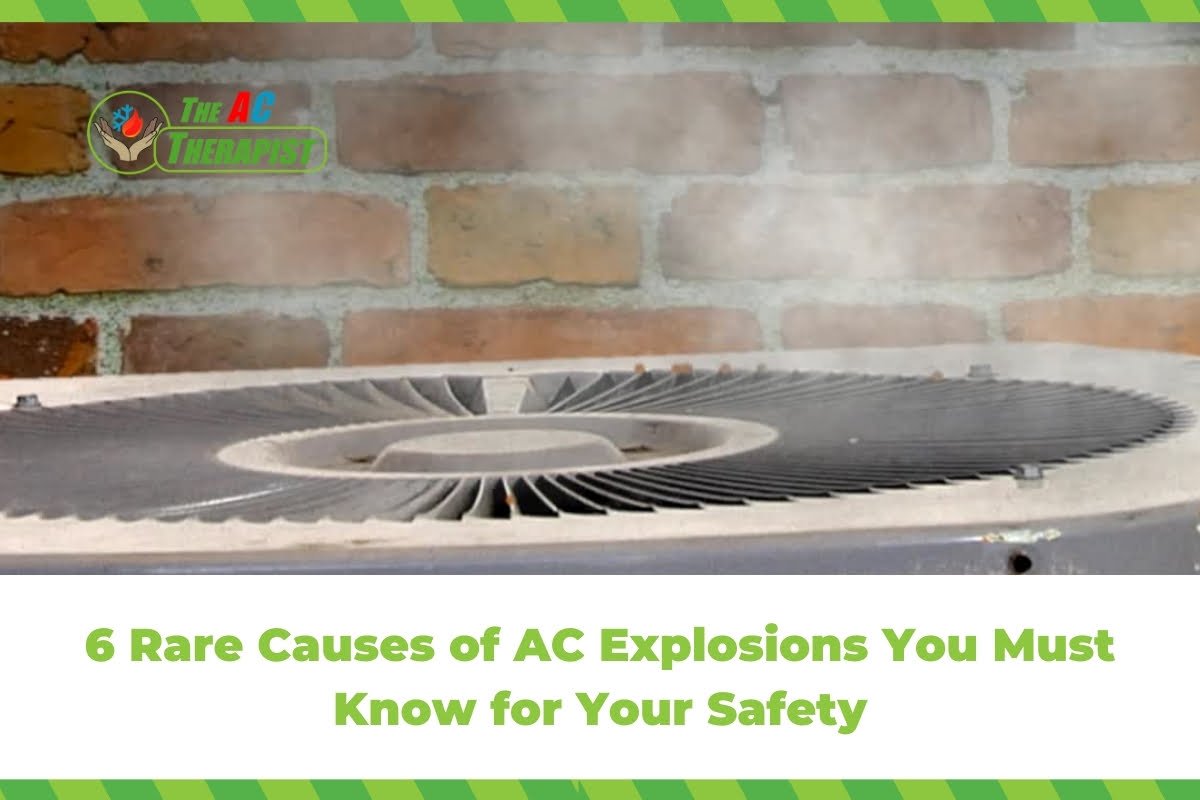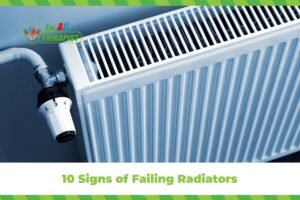6 Rare Causes of AC Explosions You Must Know for Your Safety
In an age where comfort and technology intertwine, air conditioning (AC) units play a pivotal role in our daily lives, offering sanctuary from the sweltering heat and making our living spaces bearable. However, amidst their humming and cooling, a question occasionally surfaces, tinged with concern and curiosity: Can an AC unit explode? This query is not just a testament to our dependency on these machines but also highlights our intrinsic need for safety within our homes and workplaces.
The concept of an AC unit exploding might seem far-fetched, conjuring images more aligned with action movie sequences than everyday household occurrences. Yet, the question stems from genuine concerns over electrical safety, mechanical malfunctions, and the potential hazards these can introduce. Air conditioners, after all, are complex assemblies. They combine refrigerants, electrical components, and pressurized systems—elements that, under specific conditions, could pose risks.
This blog aims to dissect the layers of this question, peeling back the technical complexities to reveal the truth about the safety of air conditioning units. We’ll explore the mechanics of AC operation, debunk myths, and scrutinize the conditions under which an AC unit might fail or, in extreme cases, lead to dangerous situations. It’s a journey through the fundamentals of refrigeration and electrical safety, guided by expert insights and peppered with tips for ensuring your cooling system remains both efficient and safe.
Understanding the potential risks associated with air conditioning units, and how to mitigate them, is crucial for anyone relying on these devices for comfort. By examining historical incidents, maintenance practices, and safety standards, we endeavor to provide a comprehensive overview that not only answers the burning question but also equips you with the knowledge to maintain a secure and comfortable environment.
As we embark on this exploration, remember: that knowledge is power. The more we understand about the devices we depend on, the better equipped we are to use them safely and effectively, ensuring they contribute to our comfort without compromising our safety.
How AC Units Work
To fully grasp the concerns surrounding the safety of air conditioning (AC) units, including the question of whether they can explode, it’s essential to understand how they operate. At their core, AC units are marvels of engineering, designed to transfer heat from the interior of a building to the outside, thereby cooling the indoor space. This process involves several key components and principles of thermodynamics.
The Refrigeration Cycle
The heart of an AC unit’s operation lies in the refrigeration cycle, a process that involves the continuous circulation of a refrigerant through a closed system of coils and components. This cycle comprises four main stages:
- Compression: The refrigerant, existing as a low-pressure gas at this stage, is drawn into the compressor. Here, its pressure and temperature are significantly increased as it’s compressed into a high-pressure gas.
- Condensation: The high-pressure, high-temperature gas then flows into the condenser coils, where it is exposed to the outside air. As the refrigerant cools, it condenses into a liquid form, releasing its stored heat to the outside air.
- Expansion: The high-pressure liquid refrigerant moves to the expansion valve, where it experiences a sudden pressure drop. This rapid depressurization causes the liquid to cool further and begin to evaporate, transforming it into a low-pressure, cold liquid-vapor mix.
- Evaporation: This cold mixture then enters the evaporator coils, where it absorbs heat from the indoor air that is blown across the coils by a fan. As the refrigerant absorbs heat, it evaporates back into a low-pressure gas, cooling the indoor air. The cycle then repeats.
Key Components
- Compressor: Often regarded as the AC system’s heart, it pumps the refrigerant through the system.
- Condenser Coils: Located outside the home, these coils release the heat removed from the indoor air.
- Expansion Valve: This component regulates the flow of refrigerant into the evaporator, controlling the amount of cooling provided.
- Evaporator Coils: Situated inside the home, these coils absorb heat from the indoor air, cooling it down.
Heat Transfer
The entire process hinges on the principle of heat transfer, moving heat from one place (indoors) to another (outdoors). By exploiting the physical properties of the refrigerant, AC units can effectively “pump” heat against its natural flow, from a cooler indoor environment to the warmer outdoors.
Safety Mechanisms
Modern AC units are equipped with numerous safety features designed to prevent overheating, electrical issues, and other malfunctions. These include pressure relief valves, thermal overload protectors, and circuit breakers. Additionally, the refrigerants used today are less harmful and less flammable than those used in the past, further enhancing the safety of AC systems.
Understanding how AC units work provides a foundation for appreciating the safety measures built into these systems. While the mechanics of air conditioning involve complex processes and components, the principles of heat transfer and the cycle of compression, condensation, expansion, and evaporation are central to their operation. With this knowledge, we can better understand the potential risks and the measures taken to mitigate them, addressing concerns about whether an AC unit can “explode” with informed insight.
Can AC Units Explode?
The idea of an air conditioning (AC) unit “exploding” can sound alarming, conjuring images of dramatic destruction. However, when addressing whether AC units can explode, it’s crucial to differentiate between an actual explosion—in the sense of a sudden and violent burst due to internal pressure or chemical reaction—and other types of failures that might be perceived as explosions but are technically different.
Understanding “Explosions” in AC Units
True Explosions Are Rare: In the traditional sense, explosions within AC units are extremely rare. Such events would require a specific set of circumstances, including the presence of a highly flammable refrigerant or gas and an ignition source, conditions that modern safety regulations and AC designs strive to prevent.
Perceived Explosions: What might be perceived as an “explosion” can often be attributed to different types of failures or malfunctions within the unit. These can include electrical shorts, capacitor failures, or compressor malfunctions, which can result in loud noises, smoke, or even fire—giving the impression of an explosion without the actual violent, destructive force associated with a true explosion.
Safety Measures and Regulations
Modern AC units are designed with a myriad of safety features and are subject to strict regulations and standards to minimize risks. These include:
- Pressure Relief Valves: To prevent excessive pressure build-up within the system.
- Thermal Overload Protectors: To shut down the unit if it overheats.
- Regular Maintenance and Inspections: To identify and rectify potential hazards before they become serious.
- Use of Safer Refrigerants: Many modern systems use refrigerants that are less harmful and less flammable.
Causes
Actual explosions within air conditioning (AC) units are exceedingly rare due to the stringent safety measures, regulations, and design improvements implemented over the years. However, certain malfunctions or failures in AC systems can create conditions that might lead to incidents perceived as explosions or, in very rare instances, might cause actual explosive reactions. Here are some potential causes associated with these highly unlikely events:
1. Electrical Failures
Electrical issues are among the most common causes that could lead to dangerous situations in AC units. Faulty wiring, overloaded circuits, or failed components can cause sparks or fires. While not explosions in the traditional sense, these electrical fires can rapidly expand and cause significant damage, potentially being perceived as explosive events.
2. Refrigerant Leaks and Flammable Gases
Most modern AC units use refrigerants that are not flammable under normal conditions. However, leaks in a system using flammable refrigerants (less common in residential units and more in industrial settings) can pose a risk if the leaked gas finds an ignition source. This could lead to a combustion event that, while still not an explosion by definition, might be mistaken for one due to the sudden and forceful nature of the reaction.
3. Compressor Pressure Build-up
The compressor is a critical component of the AC unit that operates under high pressure. Faulty pressure relief valves or malfunctions within the compressor can lead to excessive pressure build-up. If this pressure is released suddenly, it can cause loud noises and potentially disperse parts of the compressor at high speeds, creating a scenario similar to an explosion.
4. Capacitor Burst
Capacitors in AC units store electrical energy, and a failure can lead to a burst. This event can emit a loud noise and sometimes sparks or smoke, mimicking an explosion. Proper maintenance and timely replacement of capacitors can prevent such occurrences.
5. Overheating Components
Overheating can occur in various parts of the AC unit due to poor maintenance, blocked airflow, or component failure. In extreme cases, overheating can lead to fires or damage to internal components that might cause loud noises or sudden malfunctions, contributing to the perception of an explosion.
6. Mechanical Failures
Other mechanical failures within the AC unit, such as broken fans or malfunctioning motors, can lead to conditions that, while not causing explosions, might result in sudden and loud breakdowns that could be startling and perceived incorrectly as such.
Potential Risks in AC Units
While air conditioning (AC) units are essential for comfort in many homes and businesses, it’s crucial to understand the potential risks associated with their operation. Despite being designed for safety and efficiency, AC units, like any complex electrical appliances, can encounter issues. The possibility of an AC unit causing an “explosion” is a topic of concern for some, although true explosions are extremely rare. Here, we’ll delve into the potential risks in AC units, emphasizing situations where the term “explode” might come into play, even if metaphorically in most cases.
Electrical Failures
One of the primary risks in AC units that could lead to situations perceived as an explosion involves electrical failures. Faulty wiring, overloaded circuits, or short circuits can potentially cause sparks or fires within the unit. While not an explosion in the traditional sense, such electrical issues can result in loud noises or even fire, which might be mistakenly identified as an AC unit exploding.
Refrigerant Leaks
Modern AC units use refrigerants to cool air, which are generally safe under normal operating conditions. However, should a leak occur, the release of refrigerant into the air poses several risks, including health hazards from inhalation. While the likelihood of a leak leading directly to an AC unit exploding is minimal, in scenarios where flammable refrigerants are used (though rare in residential settings), there’s a theoretical risk that an ignition source could cause a fire or explosion.
Compressor Malfunctions
The compressor is under significant pressure, making it a critical point of concern regarding the potential for an AC unit to explode. Should the compressor fail catastrophically, the sudden release of pressure could cause loud noises or disperse debris, mimicking an explosion. Although actual compressor explosions are exceedingly rare due to safety mechanisms designed to prevent such outcomes, the perception of an explosion can occur in these instances.
Capacitor Failures
Capacitors store electrical energy, and their failure can sometimes be dramatic, potentially leading to a scenario where one might say an AC unit has exploded. When a capacitor fails, it can burst or produce a loud popping noise, accompanied by smoke, creating the illusion of an explosion. Regular maintenance is key to preventing such failures and ensuring capacitors function safely.
Overheating Components
Overheating is another risk factor that could potentially lead to a situation described as an AC unit exploding. If the AC unit’s motor or other components overheat significantly, it could result in damage to the unit, including the melting of internal components or even a fire. While not an explosion in the strictest sense, the consequences of overheating can be severe and sudden, resembling an explosive event in terms of immediate impact.
Maintenance Tips to Prevent Accidents
Ensuring air conditioning (AC) units are maintained regularly is crucial for preventing accidents and avoiding scenarios that might lead to misunderstandings or concerns about an AC unit potentially exploding. Actual explosions in AC units are extremely rare, but proper maintenance can help prevent situations that could be perceived as such due to sudden malfunctions or failures. Here are essential maintenance tips to keep AC units operating safely and efficiently, thereby minimizing any risk associated with explosive misconceptions.
Regular Replacement or Cleaning of Air Filters
Clogged or dirty filters can significantly hinder airflow, forcing the AC unit to work harder, and potentially leading to overheating. Keeping air filters clean or replacing them regularly ensures the unit operates efficiently, avoiding overheating scenarios that could alarmingly mimic an explosion.
Maintaining Proper Refrigerant Levels
Incorrect refrigerant levels can lead to compressor overheating and potential failure. While not an explosion in the traditional sense, compressor failure can emit loud noises, creating a startling effect akin to an explosion. Regular checks ensure refrigerant levels are optimal, preventing such issues.
Inspection of Electrical Connections
Loose or faulty electrical connections can cause short circuits or fires, potentially resulting in sudden, loud, and alarming incidents. Regular inspections by qualified professionals can identify and fix any electrical issues before they lead to serious problems.
Cleaning of Coils and Removal of Obstructions
The efficiency of the heat exchange process in AC units relies heavily on clean and unobstructed condenser and evaporator coils. Dirt or debris on these coils can cause the system to overheat, potentially leading to mechanical failures that might be wrongly interpreted as an explosion. Cleaning these coils ensures the system runs smoothly.
Checking the Condensate Drain
A blocked condensate drain can lead to water damage and affect the AC unit’s components, risking sudden failures that might be perceived dramatically. Keeping the condensate drain clear is essential for the smooth operation of the unit.
Scheduling Professional Inspections
Annual or bi-annual inspections by HVAC professionals can uncover hidden issues that might not be apparent to AC owners. These inspections are crucial for identifying potential problems that could escalate into serious concerns if left unaddressed.
Monitoring for Unusual Noises or Odors
Early signs of AC unit issues can often be detected through unusual noises or odors emanating from the system. Prompt attention to these signs can prevent mechanical failures that could be startling and misunderstood as an explosion.
Exploring the Unthinkable: Can Your AC Unit Explode? A Comprehensive Guide by The AC Therapist
In our journey today, we’ve dissected the alarming question that occasionally shadows the minds of many homeowners and business operators: Can an AC unit explode? It’s a concern that, while rooted in safety and understanding, often stems from a mix of myths and rare, documented incidents. As your dedicated AC Therapist, I’ve delved deep into the mechanics of air conditioning units, the science behind their operation, and the safety protocols that guard against such extreme outcomes.
The essence of our exploration reveals that while the possibility of an AC unit “exploding” in the literal sense is exceedingly rare, understanding the factors that could potentially lead to hazardous situations is crucial. Electrical issues, refrigerant leaks, and pressure build-up within the system represent some of the concerns that, if left unchecked, could escalate into serious problems. However, it’s the knowledge of these issues and the proactive measures to prevent them that empower us.
At The AC Therapist, our commitment extends beyond repairing and maintaining your AC units. We strive to be educators and advocates for your safety and comfort, providing you with the insights and knowledge needed to navigate the complexities of HVAC systems. Regular maintenance, immediate attention to unusual signs, and a partnership with trusted professionals like us are your best defense against the rare but potential risks associated with air conditioning units.
Let this guide serve as a reminder of the importance of vigilance, regular check-ups, and the peace of mind that comes from knowing your AC system is in expert hands. Together, we can ensure that your AC unit continues to provide the cooling comfort you rely on, without compromising safety. For any concerns, or questions, or to schedule your next maintenance visit, remember that The AC Therapist is here for you—ensuring your air conditioning needs are met with the highest standards of safety and efficiency. Your comfort, safety, and peace of mind are our top priority, today and always.













